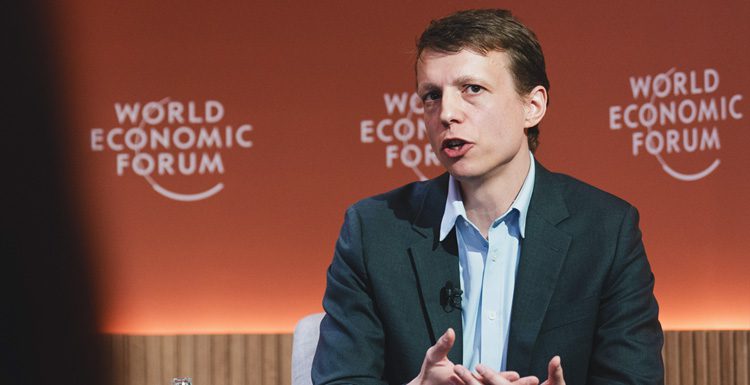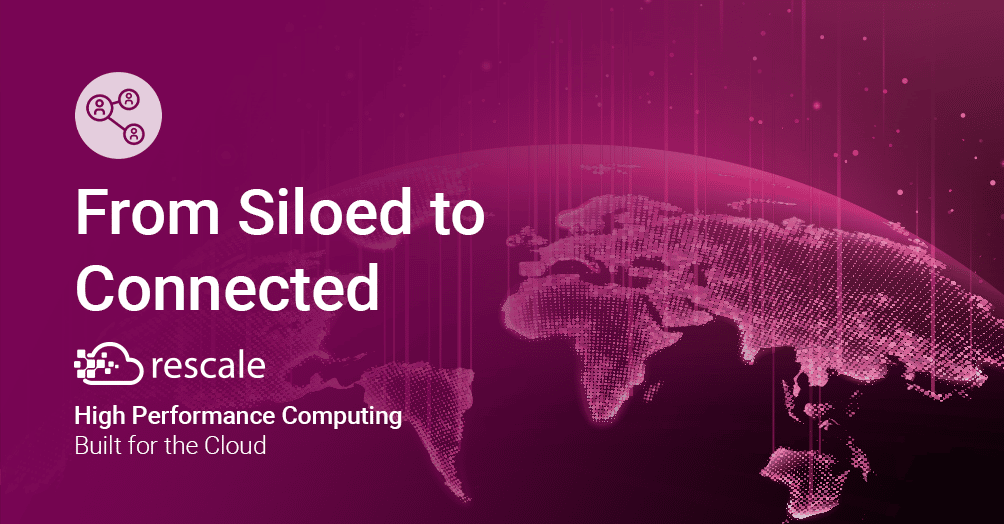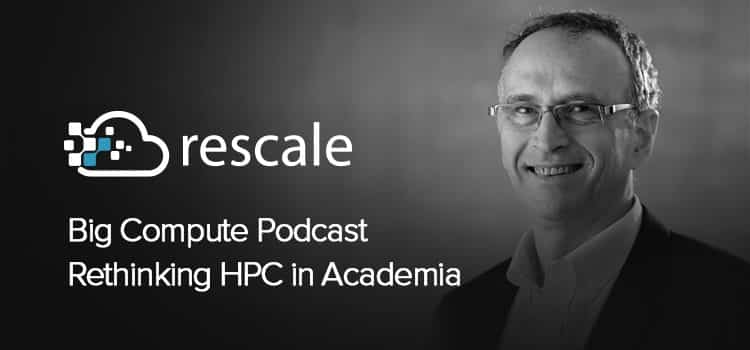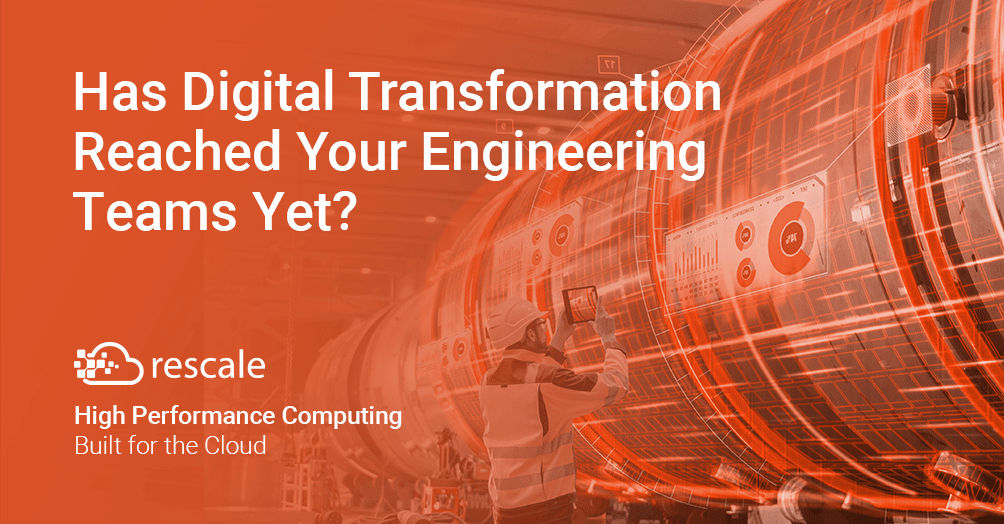Insights from Davos 2024: A Transformative Week at the World Economic Forum
Leading AI and sustainability discussions on the world stage
Attending the World Economic Forum Annual Meeting in Davos is a unique experience simply unmatched by any other conference. At no other time and place can you find this unparalleled combination of thought leaders, company executives, academics, politicians, and media in one physical location, all with the goal of addressing global issues and facilitating dialogue on how to improve circumstances for the future.
With Rescale named a Global Innovator Unicorn by the World Economic Forum, this was my second opportunity to attend as Rescale’s CEO, and I found myself departing the Davos Annual Meeting with even more insights, connections, and inspiration to grow Rescale’s impact and role as a positive influence for good in this world through the enablement of rapid engineering innovations and scientific breakthroughs through accelerated computing.
This year, Rescale’s CFO, David Si, was able to join our presence at Davos, and together we stepped into the energizing landscape of the Swiss Alps, ready to contribute to an imperative story that was palpable in that cold, crisp Davos air – AI, and its critical impact on our world.
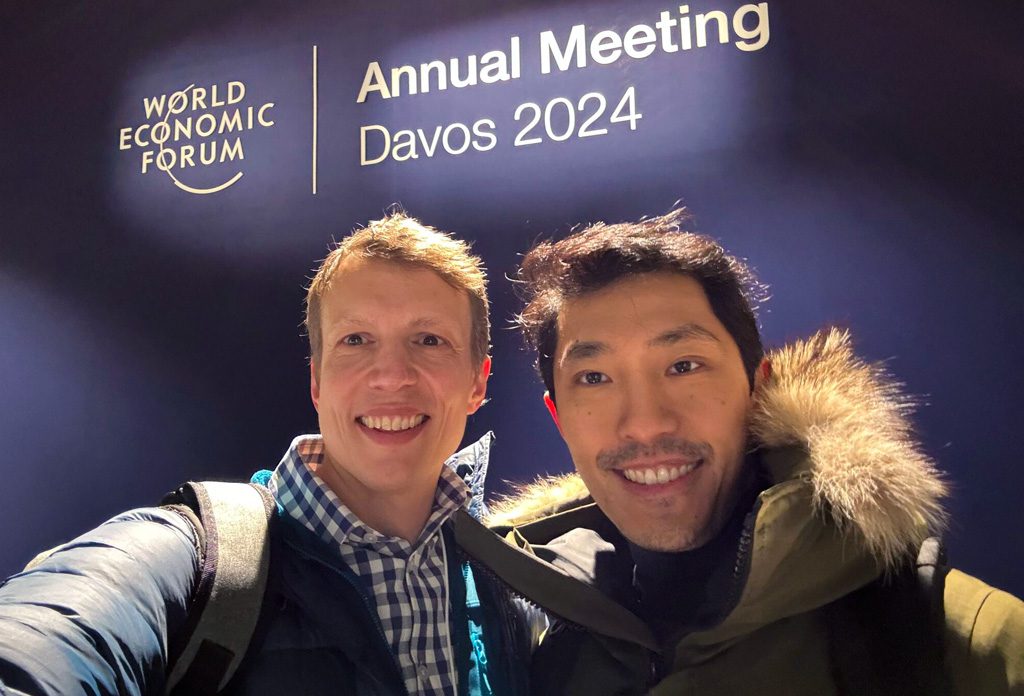
Spreading the Word About AI Physics
With Rescale leading the way in high performance computing in the cloud, we provide a platform for innovators across industries to run physics simulations and research at an accelerated pace, and we’ve been taking advantage of AI by implementing its benefits into our platform in the most strategic ways possible. And we’re just getting started with what can be achieved. AI physics has the potential to revolutionize product design, engineering development, and scientific discovery entirely, as previously shared in an article for the World Economic Forum.
It’s evident today that tools like ChatGPT, Bard, and GitHub Copilot are already reshaping how we approach work and life, but what often goes unnoticed is the profound potential of AI to revolutionize the very essence of research, engineering, and physical product design.
Scientific computing and engineering are pivotal for innovation, often relying on massive computing power from supercomputing clusters. AI is stepping in to supercharge these processes, making simulations more cost-effective and efficient. By leveraging machine learning models and AI-physics tools, organizations can glean insights faster, cutting down on the need for extensive simulations. This not only lowers costs but also accelerates the pace of innovation, and has profound potential for our world.
It’s with all this in mind that I ventured to Davos for a second time, to share our insights to drive technology forward through AI and unlock the next phase of global innovation. And the week did not disappoint – we were able to engage in panel discussions, connect with global leaders, and contribute to crucial conversations shaping our future.
Prosperity Through Data Infrastructure
One of the highlights of the week was participating in a discussion titled “Prosperity Through Data Infrastructure” (available to stream on-demand here) alongside panelists Digital Transformation Minister of Slovenia, Emilija Stojmenova Duh, Group CEO of e&, Hatem Dowidar, and Founder & CEO of Weights & Biases, Lukas Biewald, with moderator, Executive Editor of Quartz, Heather Landy.
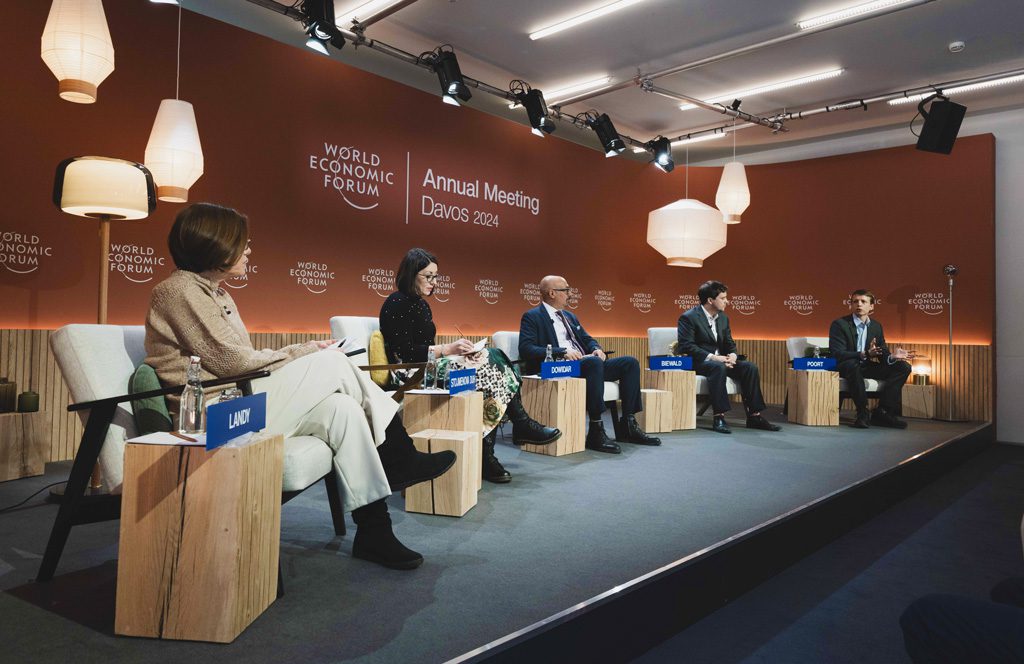
In our discussion, we began with the premise that advances in AI technology are underpinned by a robust infrastructure that includes data, computing resources, and development tools. Then we explored how infrastructure development can align with the rapid advancement of AI, and we delved into the role of data infrastructure in promoting global competitiveness and inclusion.
Key takeaways emphasized the critical importance of digitization, collaboration, and public-private partnerships, and how infrastructure can ensure greater interoperability and more seamless data integration across various AI systems, promoting global collaboration.
We also touched on the best ways to align infrastructure development with the rapid advancement of AI with the goal of enabling competitiveness and inclusion, and how the private sector can act as an accelerator for the responsible deployment of digital infrastructure.
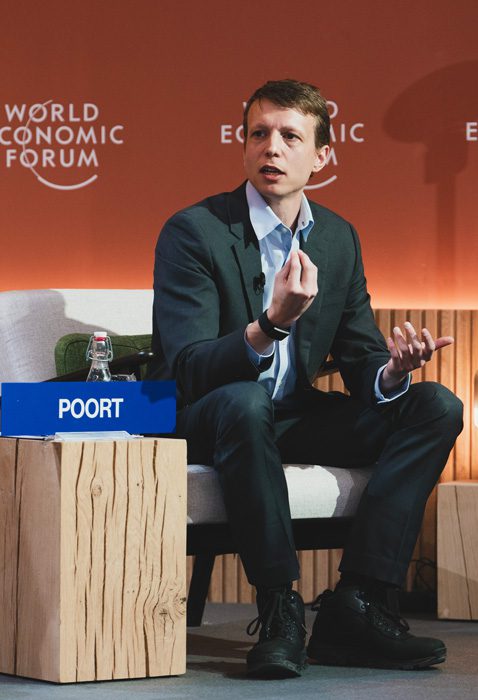
Frontier Technologies in Advanced Manufacturing Operations
Another engaging panel, “From Potential to Scale: Frontier Technologies in Operations,” allowed me to discuss how new technologies can enable fundamental shifts, from digitization to the latest in AI and robotics – exciting subjects to discuss in a room of people aligned on goals to shape our future for good.
Sitting beside panelists Eva Maydell of the European Parliament, Kathryn Wengel of Johnson & Johnson, and Cambridge researcher and Co-Chair Council on the Future of Advanced Manufacturing and Production at the World Economic Forum, Jagjit Singh Srai, we highlighted the need for foundational capabilities, ecosystem standards, collaborations, and public-private partnerships to drive comprehensive insights and value creation throughout the supply chain.
Some key takeaways from that session include:
- Implementing the basics of digitization and data capture are critical to providing foundational capabilities upon which more complex technologies can be deployed.
- Ecosystem standards, collaborations, and incentives are needed to provide end-to-end connectivity throughout the supply chain to yield comprehensive insights and new opportunities for value creation.
- Public-private partnerships are crucial for establishing the correct governance and standards, creating suitable guardrails, and simultaneously fostering technological adoption and the emergence of new innovations.
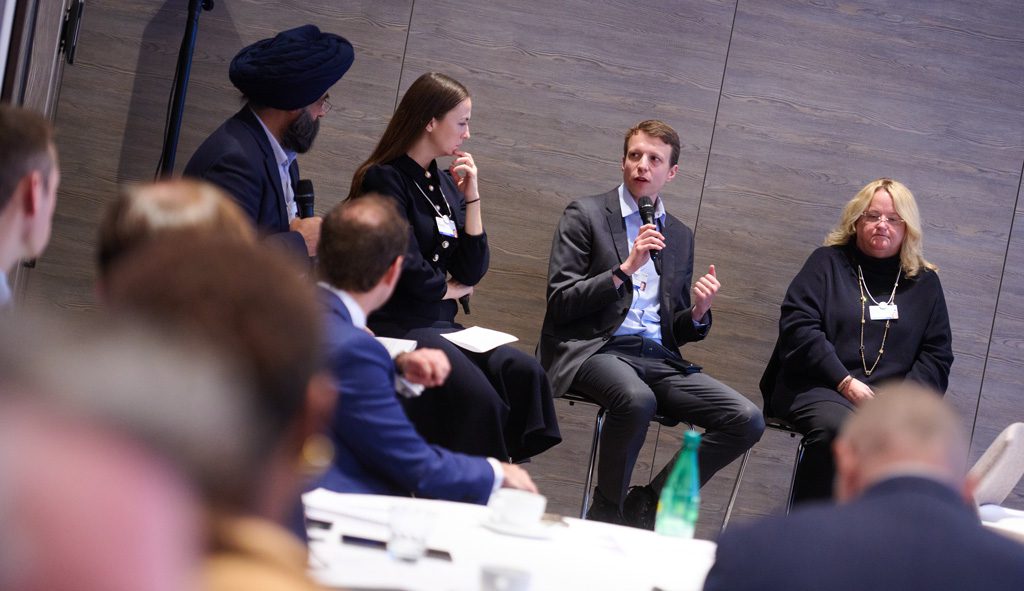
Reimagining AI Strategies for Sustainability
As computing technologies and AI continue to advance at a breathtaking pace, we can’t ignore the equally significant energy usage and carbon footprint that accompany the use of these technologies, and need to ensure sustainable computing practices along the way.
As I’ve shared in an article about computing sustainability for the World Economic Forum, at Rescale, we believe that embracing a number of components for sustainable computing practices is key to advancing technology while responsibly respecting our planet. Specifically:
- We advocate for improved server utilization through cloud computing, as higher utilization translates to fewer servers and reduced power consumption.
- We encourage the shift toward domain-specific architectures, such as graphics processors and tensor processors, which offer impressive performance gains for specific workloads, optimized for efficiency.
- We enable workload portability through automation and facilitating the assessment of chip efficiencies to make greener chip options more accessible.
- We stress the importance of cleaner, more sustainable cloud computing data centers, encouraging innovative approaches and incentives such as negative-carbon solutions and capturing data center heat for reuse as a supplementary energy source.
- We believe that automating the assessment of chip efficiencies will best match hardware and software for use with the most efficient power consumption.
I was pleased to discuss some of these sustainability strategies in a panel hosted by AI House Davos, titled “Reimagining Your Strategy for Sustainable, Responsible, and Innovative AI,” alongside Neil MacDonald of Hewlett Packard, May Habib of Writer, and Chase Lochmiller of Crusoe. Together, we exchanged views on the challenges and opportunities presented by AI, and explored strategies for sustainable and responsible AI deployment.
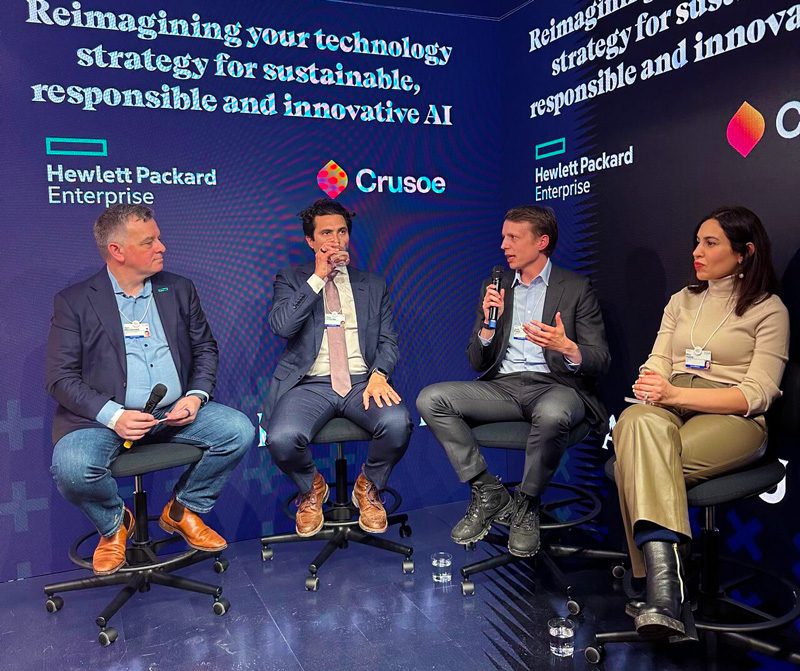
At Rescale, we are dedicated to supporting organizations in achieving their sustainable computing goals through the development of the necessary ecosystem, technologies, and capabilities, and it was a privilege to share insights on this subject with others of a like mind.
Celebrating Partnerships and Achievements
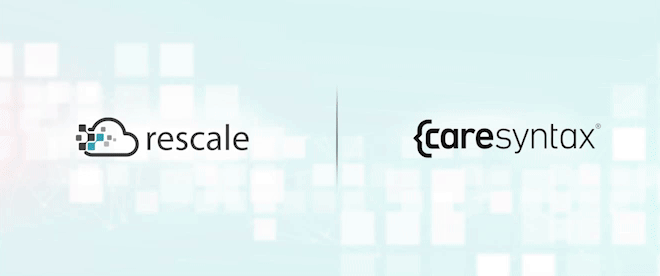
Amidst the week’s excitement, Rescale also proudly announced successful partnerships and celebrated achievements with innovative companies actively contributing to positive change at the World Economic Forum. Collaborations with the following leading companies exemplify our commitment to working with forward-thinking leaders across various industries:
- Caresyntax – Leading surgical data and intelligence platform
- Crusoe – Pioneering force in sustainable computing solutions
- Intelligent Energy – Pioneer in fuel cell technology
- IonQ – Leader in quantum computing
- Neural Concept – Leader in 3D deep learning technology for engineering
- Svante – Leading innovator in carbon capture and removal
We are enthusiastic about these new collaborations and eagerly anticipate further innovative developments with each of them.
Gratitude and Meaningful Connections
Alongside the opportunities to share best practices, address global challenges, and facilitate dialogue around some of today’s most pressing issues, I am incredibly grateful for the opportunity to connect with so many exceptional people face-to-face – from company leaders to investors to friends – these meaningful conversations and insights further solidified Rescale’s commitment to making a positive contribution in the ever-evolving landscape of technology and innovation.
A special highlight in Davos was spending more time together with OpenAI’s Sam Altman and a group of talented company founders all compelled to build a better future. With much to discuss since our first days at Y Combinator over a decade ago, we spoke for hours late into the evening and came away with a deeper appreciation for the kind of mentality that can be a powerful fusion to build prosperity for everyone.
Rescale is fortunate to have both Sam Altman and Y Combinator as company investors, and it’s been a privilege to share our growth and accomplishments all along the way to Davos.
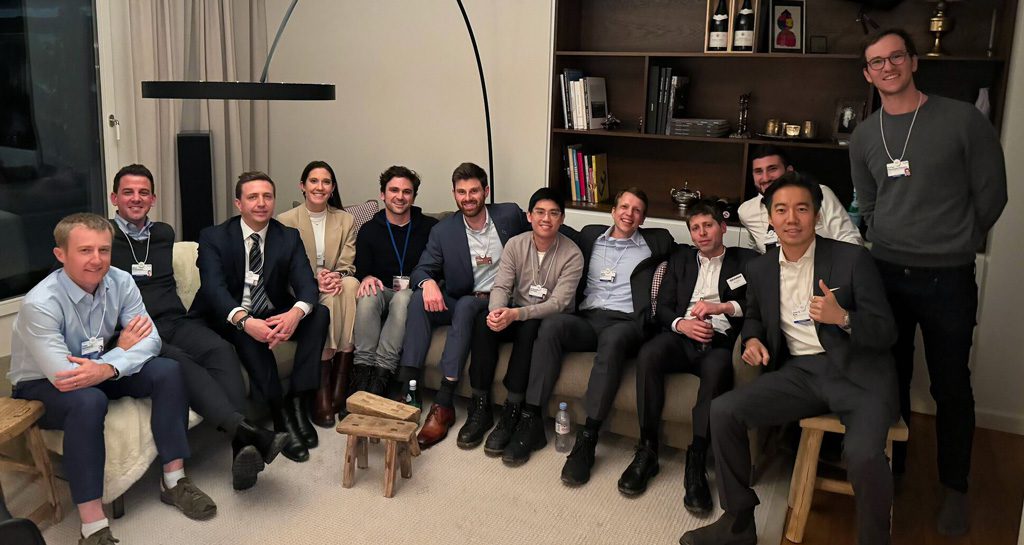
Conclusion
The World Economic Forum Annual Meeting in Davos provided a platform to engage in transformative discussions and connect with global leaders in an insightful and energizing way. As we navigate the complexities of technology, you can be certain that Rescale remains at the forefront, shaping the future of AI and computing with a dedication to positive change.

